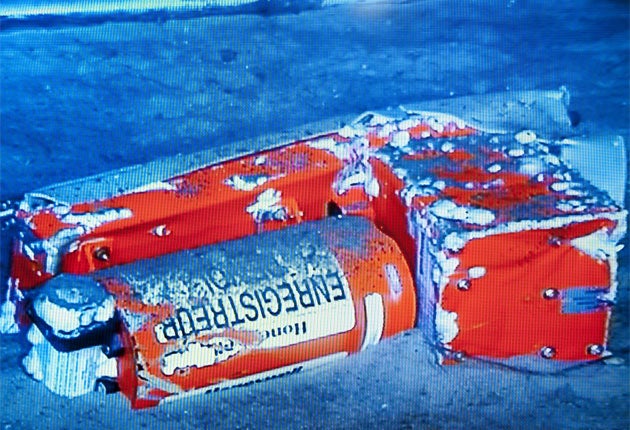Second black box may finally unlock secrets of Air France crash

Your support helps us to tell the story
From reproductive rights to climate change to Big Tech, The Independent is on the ground when the story is developing. Whether it's investigating the financials of Elon Musk's pro-Trump PAC or producing our latest documentary, 'The A Word', which shines a light on the American women fighting for reproductive rights, we know how important it is to parse out the facts from the messaging.
At such a critical moment in US history, we need reporters on the ground. Your donation allows us to keep sending journalists to speak to both sides of the story.
The Independent is trusted by Americans across the entire political spectrum. And unlike many other quality news outlets, we choose not to lock Americans out of our reporting and analysis with paywalls. We believe quality journalism should be available to everyone, paid for by those who can afford it.
Your support makes all the difference.The cockpit voice recorder from an Air France airliner that crashed into the Atlantic two years ago was found yesterday. The jet's flight data recorder was recovered on Sunday.
A robot submarine, operating more than two miles below the surface, recovered the devices from flight AF447 flying from Rio de Janeiro to Paris, which crashed on 1 June 2009 killing all 228 passengers and crew.
French air accident investigation officials said both "black boxes" – actually orange cylinders – appeared to be intact and should help to explain what caused the Airbus 330 to dive into the South Atlantic. The French Transport Minister, Thierry Mariani, said: "We can now hope to find out what truly happened within the next three weeks."
The discovery followed the location last month of the fuselage, engines and tail-plane of the aircraft 2.4 miles below the ocean surface about 400 miles east of the Brazilian coast. Mr Mariani said the finds justified the €32m (£29m) spent in four separate searches, the most expensive and elaborate operation of its kind ever undertaken.
The bodies of more than a score of passengers, still strapped to their seats, were found within the fuselage. Efforts will be made to bring the bodies to the surface but officials have warned this may prove impossible. Many relatives have said they would prefer the bodies to remain undisturbed.
The chief executive of Air France, Pierre-Henri Gourgeon, said yesterday: "It is my heartfelt hope that the data contained in these flight recorders may be used and provide answers to questions that relatives of the victims, Air France and the entire airline industry have been asking for nearly two years about why this tragic accident occurred."
Data sent back to Air France computers in France while the plane was in flight suggested that the speed recorders, known as pitot tubes, may have frozen and malfunctioned. The aircraft flew directly into a heavy tropical storm. There has also been speculation about possible pilot error.
Air France and Airbus were placed under formal investigation for manslaughter in March by a French examining magistrate. Investigators warned, however, that there was probably no single explanation for the crash. Without the black boxes, they said, the mystery might never be solved.
The data recorders will now be flown back to the laboratories of the French aviation accident investigation agency, the Bureau d'Enquêtes et d'Analyses (BEA), at Le Bourget, north of Paris within the next week. The director of the BEA, Jean-Paul Troadec, said yesterday that the second black box seemed to be intact. "Globally, the instrument seems externally to be in a good state," he said. Only when the boxes are returned to Paris would it be known whether their data was intact, he added. "If we can read what is in the two flight recorders, we will finally know what happened."
Families of victims of the AF447 crash welcomed the find yesterday. "It is wonderful news, especially since the boxes seem to be intact," said Jean-Baptiste Audousset, president of a group representing families of the victims. "We are now waiting to hear when the first tests will be carried out to investigate whether bodies can be recovered."
Mr Audousset said officials had promised that every effort would be made to recover bodies but that there was no guarantee that this would be technically possible at such great depth.
The president of the French pilots' union, the SNPL, Jean-Louis Barber, said his members would study the report on the contents of the black boxes with "the greatest attention". If pilot error is established, "we will acknowledge it but we are still [concerned about] the speed sensors," he said.
Join our commenting forum
Join thought-provoking conversations, follow other Independent readers and see their replies
Comments